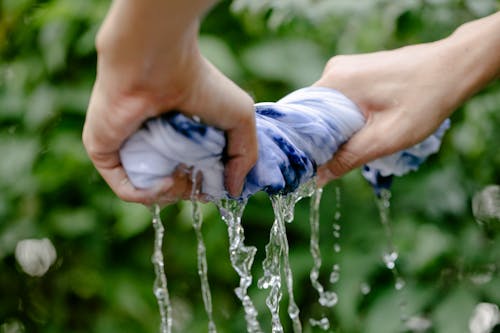When you’re expecting, there’s a lot of things to put into consideration. Immediately you find out you’ve conceived, a change of lifestyle ensues, selecting baby bump-friendly activities over those not recommended. But since you have to keep clean, how do you wash clothes by hand during early pregnancy?
It can be helpful to wash delicate items and those that require careful detailing by hand when you’re pregnant. But your body is awash with pregnancy hormones during the first trimester, and you could be prone to sensitive skin. You shouldn’t bend or strain your back when washing clothes and use non-biological detergents or fabric softeners that are kind-to-skin.
Taking it slow and easy is recommended, especially in the first three months of conception. It’s essential to protect yourself as well as your fetus, which at this point is highly absorbent of anything you’re exposed to. Keep reading for tips on washing clothing by hand during early pregnancy to avoid miscarriage or affecting your unborn baby’s early start.
What Risks Do I Face When Washing Clothes by Hand during Early Pregnancy?
Everyday household activities shouldn’t be of much concern during early pregnancy unless you’re doctor specifically disapproves. It’s great to get some moderate exercise for the health and wellbeing of your developing baby, but you must avoid over-exertion. For instance, when washing clothes by hand, don’t bend more than 20 times or lift a heavy object.

Exhaustion and back injury can lead to severe congenital disabilities or even preterm birth. Prolonged standing isn’t encouraged either, as your changing weight places undue pressure on your lower body, causing cramps. Early pregnancy hormones impact the joints and ligaments of your backbone so that your expanding belly is accommodated.
As such, you’re prone to loss of balance, postural or other injuries from bending repeatedly or standing too long. That’s a concern even when you haven’t started to show, as the fetus’s first trimester is the most formative period.
Can I Wash Clothes by Hand during Early Pregnancy?
Doing certain chores during the first trimester increases the risk of injury, back strain, or interference with your pelvic floor muscles. Hormonal changes soon after conception loosen the tough ligaments of your joints, making you prone to injuring your sciatic nerve. Any household tasks, like cleaning or washing clothes by hand, should be approached with care and a preference for comfort.
Your pregnancy weight starts to increase during the early months, and lots of bending increases the chances of miscarriage. Injury to your back or pelvis through prolonged standing puts your baby at risk of preterm birth, placenta previa, high blood pressure, or other conditions.
While most cleaning chemicals won’t harm your pregnancy, large amounts of exposure lead to congenital disorders. Your baby will have future health problems when toxins from laundry detergents are breathed or swallowed. Wear gloves or a breathing mask when using certain products, especially containing solvents or fragrance phthalates.
Warning labels will often indicate what’s safe for a pregnant mother to use, so pay attention to these. You can better protect your developing fetus by buying ‘green’ or natural washing products. Use mixtures of vinegar, lemon juice, and baking soda as stain removers or whiteners in the place of ammonia or chlorine bleach.
What Type of Soap Should I Use to Wash Clothes by Hand When Pregnant?
If you’re without a washing machine, or when you’ve got delicate garments that require careful detailing. During early pregnancy, washing clothes by hand must begin with selecting a mild detergent that’s safe for your developing baby.
For clean damage free clothes, your gentle non-biological detergent will work on fabrics like silk, lace, or wool. If you have delicate clothing items, liquid washing soap or even baby shampoo will work well.
You can also make washing silk, lace, or fine-knit material easier with no-rinse detergent. Once you’ve soaked your clothes in the detergent’s solution with water, there’s no need for rinsing, which minimizes damage. Detergents with lanolin, a natural animal product, help make your wools and fine-knits softer.
How Do I Wash Clothes by Hand during Early Pregnancy?
To wash clothes by hand during pregnancy, fill two tubs or your sink with about ¼-full water. Let the water be around 85° Fahrenheit, not too warm or too cold. Heat makes clothing dye bleed while your detergents’ stain removal capabilities aren’t optimal at lower temperatures.
Add your preferred gentle to skin detergent that doesn’t contain biological enzymes to one of your water tubs. For each item of clothing, use at least a teaspoon. Separate dark and light clothes, washing each item separately to avoid color bleeds. New garments that haven’t been washed yet should also be separated so that the dye doesn’t affect other clothing.
If you’re washing delicate clothes, avoid scrubbing, twisting, or rubbing as that will damage them. Instead, make a swishing movement with the clothes in the water detergent mixture, maintaining the action for at least two or three minutes. Soaking fragile garments in water for longer than five minutes can also result in shrinkage.
For more robust fabrics like cotton or polyester, don’t rub too much, as this rips or stretches their fibers, making them threadbare. Pay extra attention to shirt collars, underarms, and pant pocket lines which may have congealed oils and dirt. Soak such garments in gentle stain removers, or a mixture of baking powder and white vinegar, to break down organic stains.
Drying Clothes after Washing by Hand for a First-Trimester Mum
Washing clothes by hand during pregnancy may require you to take several breaks if your load of laundry is significant. You’ll do most of your cleaning while seated, although you can stand at intervals but never for prolonged periods.
After washing your clothes, rinse them in the other tub of water, unless you’ve used a no-rinse detergent. Make sure that the soap runs off completely, and dunk them underwater again until they’re no longer soapy. Twisting and wringing warps the fabric, so let excess water drip for a minute.
Let clothes air dry if possible, using a line for normal fabrics but laying sensitive ones flat. You can also use a drying rack, which helps reshape clothing, so they don’t lose their natural shape. If it’s sunny outside, wait for a couple of hours before flipping or turning your garments over. Too much sunlight will fade colored clothes, but whites benefit from its natural bleaching effect.
Conclusion
Avoid using regular biological detergents when washing clothes by hand during pregnancy unless you’ve protected your hands with gloves. Ensure that you have sufficient ventilation in the area you’re doing your laundry, and always chose a seated position over a standing one.

I’m Cathrine and I’m a 39-year-old mother of 3 from Utica, New York. And I’m extremely happy you’ve come to visit my hide-out on the web. Here I post about everything related to family-life and usually it will involve babies and lessons I’ve learned over the years from experts, friends, and my own mistakes. So hopefully you will find what i write fun and informational!


